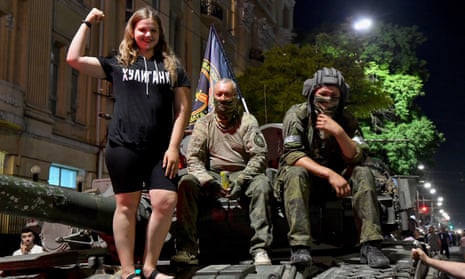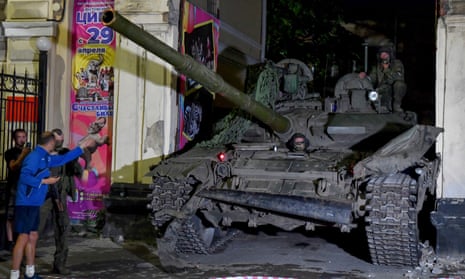Key events
The wires have been sending through images from Rostov, from where Wagner troops are withdrawing.
Many people appeared to be perfectly happy to see them on the streets and Wagner leader Yevgeny Prigozhin was pictured smiling and shaking hands with civilians as he left the headquarters of the southern district command.



US suspected Prigozhin plan to launch action against military leadership, US media reports
US spy agencies picked up information suggesting Wagner leader Yevgeny Prigozhin was planning to take action against Russia’s military leadership as early as mid-June, US media has reported.
Over the past two weeks there was “high concern” about what may happen regarding president Vladimir Putin’ grip on power and the country’s nuclear arsenal, the Washington Post reported, citing anonymous US officials.
The exact timing and nature of Prigozhin’s plans were not clear until Friday, when the Wagner leader first began posting about an alleged Russian rocket attack on his forces, but “there were enough signals to be able to tell the leadership … that something was up,” the Post quoted one official as saying.
According to the New York Times, senior American national security officials had indications as early as Wednesday that Prigozhin was preparing to take action and intelligence officials conducted briefings with the Biden administration and defence officials on the same day.
A narrow group of congressional leaders were informed on Thursday, when additional confirmation of the plot came in, the Times reported.
Wagner boss Prigozhin agrees to call off march on Moscow and leave the country
Wagner leader Yevgeny Prigozhin has agreed to leave Russia and ordered his fighters to withdraw from Rostov and halt their march on Moscow, under the terms of a deal negotiated by Belarus.
At the end of an extraordinary day, during which a visibly angry Vladimir Putin had made an emergency television broadcast railing against the “deadly threat to our state”, Progozhin said that he wanted to avoid shedding Russian blood and would order his troops back to their bases instead.
Kremlin spokesperson Dmitry Peskov said the criminal case that had been opened against Prigozhin for armed mutiny would be dropped, and the Wagner fighters who had taken part in his “march for justice” would not face any action in recognition of their previous service to Russia.
Videos later showed Prigozhin, who said his men had reached within 125 miles (200 km) of the capital, and his fighters leaving Rostov.
Here’s our full report by Andrew Roth and Pjotr Sauer:
Opening summary
Events in Russia have been unfolding at breakneck pace over the past 24 hours after Wagner boss Yevgeny Prigozhin launched a march on Moscow aiming to oust the country’s military leadership, only to call it off on the same day and agree to leave the country for Belarus.
Here’s a roundup of the key developments:
-
In an abrupt about-face, Wagner chief Yevgeny Prigozhin said he had called off his troops’ march on Moscow and ordered them to move out of Rostov. Under a deal brokered by Belarus, Prigozhin agreed to leave Russia and move to Belarus. He will not face charges and Wagner troops who took part in the rebellion will not face any action in recognition of their previous service to Russia.
-
In a statement, Prigozhin said that he wanted to avoid the spilling of “Russian blood”. “Now the moment has come when blood can be shed,” he said. “Therefore, realising all the responsibility for the fact that Russian blood will be shed from one side, we will turn our convoys around and go in the opposite direction to our field camps.”
-
The Wagner leader was later pictured leaving the headquarters of the southern military district (SMD) in Rostov, which his forces had occupied on Saturday. Wagner forces also shot down three military helicopters and had entered the Lipetsk region, about 360km (225 miles) south of Moscow, before they were called back.
-
Belarus president Alexander Lukashenko’s press office was the first to announce that Prigozhin would be backing down, saying that Lukashenko had negotiated a de-escalation with the Wagner head after talking to Russian president Vladimir Putin. Lukashenko said that Putin has since thanked him for his negotiation efforts.
-
Putin has not publicly commented on Lukashenko’s deal with Prigozhin. He appeared on television earlier on Saturday in an emergency broadcast, issuing a nationwide call for unity in the face of a mutinous strike that he compared to the revolution of 1917. “Any internal mutiny is a deadly threat to our state, to us as a nation,” he said.
-
Putin reportedly took a plane out of Moscow heading north-west on Saturday afternoon. It is unclear where he went or his current whereabouts.
-
Before the Belarus deal was announced, Ukrainian president Volodymyr Zelenskiy said that: “Everyone who chooses the path of evil destroys himself. Whoever throws hundreds of thousands into the war, eventually must barricade himself in the Moscow region from those whom he himself armed.”
-
Ukraine’s military said on Saturday its forces made advances near Bakhmut, on the eastern front, and further south. Deputy defence minister Hanna Maliar said an offensive was launched near a group of villages ringing Bakhmut, which was taken by Wagner forces in May after months of fighting. Oleksandr Tarnavskiy, commander of the southern front, said Ukrainian forces had liberated an area near Krasnohorivka, west of the Russian-held regional centre of Donetsk.
I’m Helen Livingstone and I’ll be bringing you all the latest news on the conflict in Ukraine and the crisis in Russia.

